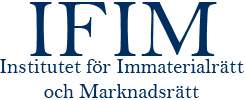
Seminar on the attribution right of employees
Seminar on the attribution right of employees
2023-10-19 @ 13:00 – 15:00 CEST
Event Details
Are we moving towards an attribution right of the employees at the interface of intellectual property, trade secrets and labour law?
Welcome to an IFIM seminar
Interested to find out more about employees’ rights in the current developments in the intersection between intellectual property, trade secrets and labour law?
This seminar is divided into two parts. The first on the basis of prof. Nari Lee and Niklas Brunn essay and the second on jur. kand Johanna Liljenbergs essay. See below.
First part
Towards an attribution right of the employees at the interface of intellectual property, trade secrets and labour law
Niklas Bruun and Nari Lee*
Hanken School of Economics, Helsinki Finland
Abstract
Intellectual property rights over the years developed with the central notion of protectable intangible object and the doctrines have become formulated in object-centric manner, defining the eligible subject matter, delineating the scope and determining the available remedies for their infringements. One consequence of the object focused evolution is that the creators and inventors have gradually become equally ‘objectified’ – considered token or highly abstract concepts, rather than persons. This is reflected in the diminished sense of moral claims left with the authors and inventors, limited to non economic right of attribution. Even the recent discussion of intelligent machine is framed as the applicability of the abstract concept of inventor and authors to AI, but rather we no longer discuss how to fairly treat the genuine authors or inventors, who are alienated from their own creations after the transfer.
Such tendency seems to be on a reversed course, with the introduction of so called ‘best seller’ clause for the author’s performers to adjust the remuneration under the Digital Single Market Directive (Article 18 and Article 20). Likewise recent cases surrounding priority claims by the joint inventors to CRISPR patent prosecution, seem to highlight there may still remain some semblance of right (moral recognition) left for the inventor’s claim to be named as an inventor against patent applicants.
In contrast, despite the increase importance of trade secret protection, trade secrets law seems to point to other directions for the employees in the process of trade secret creations. The trade secret protection is not an exclusive right, nor it creates registry of title holders. As the protection does not ask the trade secret holder to have created the trade secrets, and tied to the secrecy measures, the right to trade secrets are often acknowledged to those who ‘legitimately’ control the trade secret. In trade secret protection, the persons who are involved in the process of creating such information may not only be left unattributed, but may even be vilified as potential or actual misappropriators (or even as criminals). This paper questions if such framing of employee is correct in light of fundamental right of employee and labour law. We identify ways where employees may and should be protected as the original creators and contributors to the values of trade secrets under EU trade secrets directive, and cautiously propose a right of attribution should be granted to employees who are acting in a commercially honest manner. Such understanding would be aligned with the fundamental right of employees to engage in a business (freedom to do business) and with the right to benefit from any scientific, literary or artistic production of which he/she is the author. (ICESCR art 15 c)
This part will be in English, led by Nari Lee and Niklas Brunn

Second part
Johanna Liljenbergs examensuppsats utforskar upphovsrättsligt skyddat material skapat av lärare vid högre utbildningsinstitutioner och frågan om vem som har rätt att använda det. Arbetet fokuserar på om lärarundantaget ger lärarna för mycket kontroll över materialet och bortser från arbetsgivarnas och statens intressen, och uppnås mer rimlig balans genom att tillämpa allmänna regler om upphovsrättsligt skyddat material inom ramen för en anställning, inklusive tumregeln.
This part will be in Swedish, led by Johanna Liljenberg



